about
The Architecture Foundation
The central mandate of the Architecture Foundation is the promotion and awareness of Architecture and Urbanisation in India. More than ever before in India's history, the architect’s role as a social agent must be critically delineated and accordingly, the Architecture Foundation's mission is to address questions of economic, political and cultural change through the role of the architect. To this end, the Foundation seeks to address the deficits of architectural education by promoting a forum for critical research and thinking. This agenda is informed by the impulse to archive, document and disseminate ideas about architecture and city for practitioners while also re-introducing the general public to the saliency of architecture and environmental design, and emphasising the vital relevance of a public debate about alternative architectural pasts, presents and futures. The Foundation focuses on research projects, discussions, and the production of a public dialogue in order to situate contemporary architecture in its historical context. Equally important, the Foundation is committed to generating awareness concerning architectural and urban practices, ethics and values among the general public at large.
The Foundation has three primary initivates:
1
The creation of an archive or database on architecture and the city in India. One of the key endeavours under this head will be to re-visit, with a critical lens, already existing histories, archives, books and biographies, which could be annotated through new readings.
2
The dissemination of this knowledge and material through lectures, conferences, seminars, films, social media, exhibitions as well as books, journals and magazines.
3
A focus on capacity building through creating networks of like-minded institutions within the country and internationally. This initiative will involve creating programs and scholarships for education, teacher training and contributing to the shaping and strengthening of urban and architectural criticism and education more generally. Together, these three initiatives seek to address the greatest challenges of architects practising in India today: those of the social role and the cultural responsibility of the architect at a historical moment when the built environment has come to reflect, in often heightened and dramatic ways, the tensions between policy, ideology, expediency and aspiration.
projects team
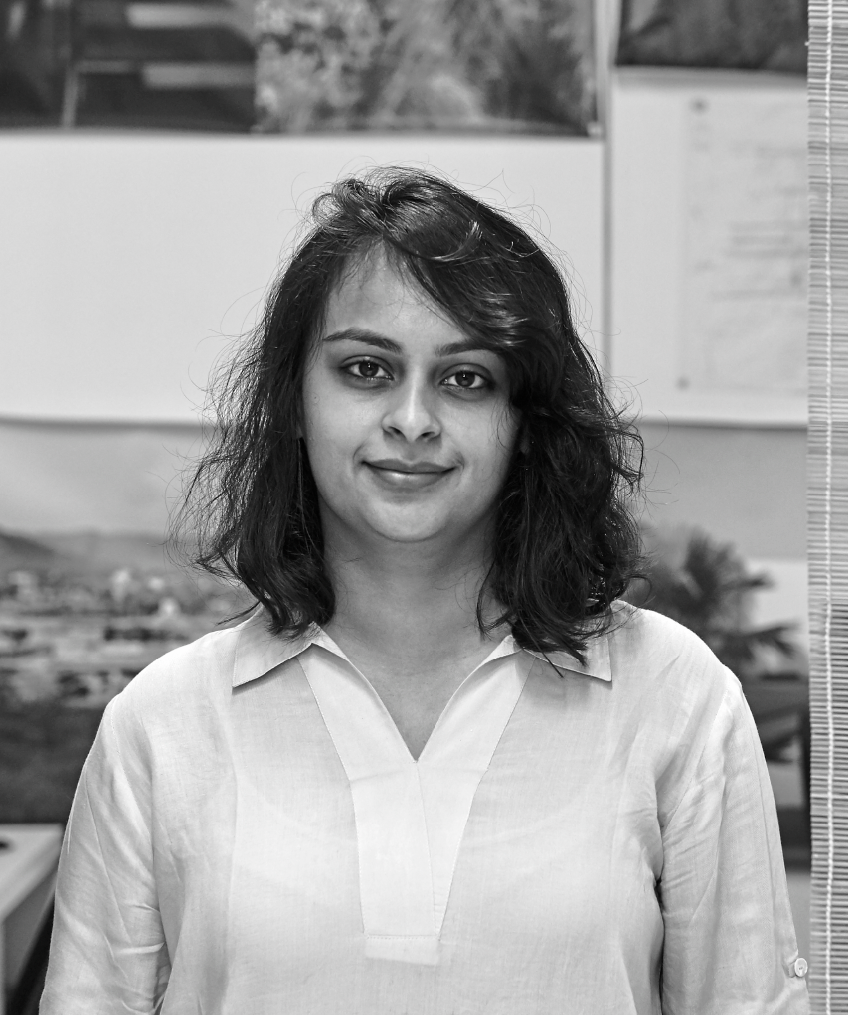
Ela Singhal
Executive Director
Ela Singhal is an architect and the Executive Director at Architecture Foundation, India where she manages research, programming and publications. She has a Masters in History Theory and Critical Thinking from the Architecture Association, London and is visiting faculty at the Balwant Sheth School of Architecture, Mumbai.
Executive Director
Ela Singhal is an architect and the Executive Director at Architecture Foundation, India where she manages research, programming and publications. She has a Masters in History Theory and Critical Thinking from the Architecture Association, London and is visiting faculty at the Balwant Sheth School of Architecture, Mumbai.
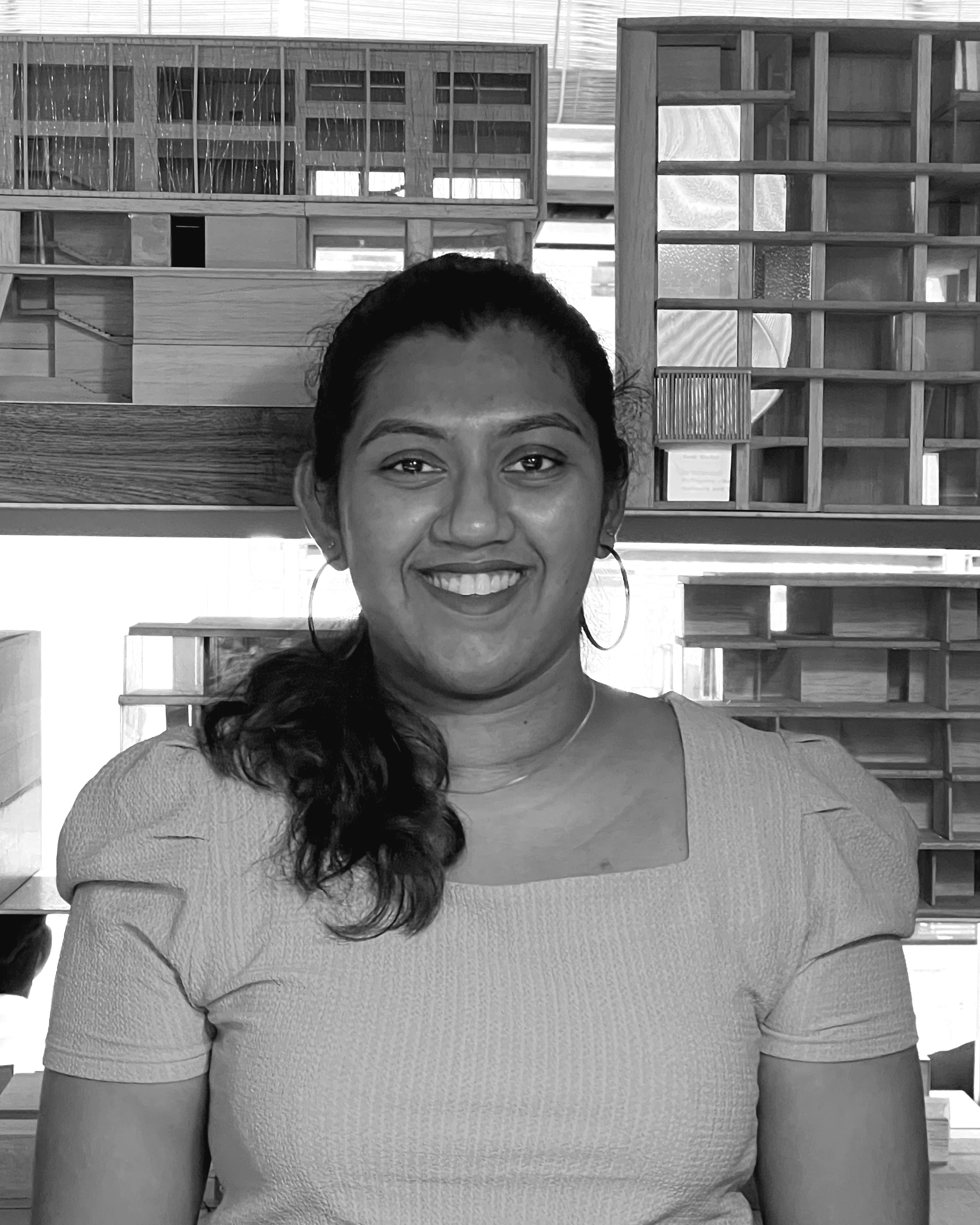
Roshini Pushparaj
Research Associate
Roshini is an architect and early career researcher currently working on exhibitions, research and archives for the Architecture Foundation. She is a post-graduate from the Masters in Architectural History and Research (MAHR) Program offered by CEPT University, Ahmedabad
Research Associate
Roshini is an architect and early career researcher currently working on exhibitions, research and archives for the Architecture Foundation. She is a post-graduate from the Masters in Architectural History and Research (MAHR) Program offered by CEPT University, Ahmedabad
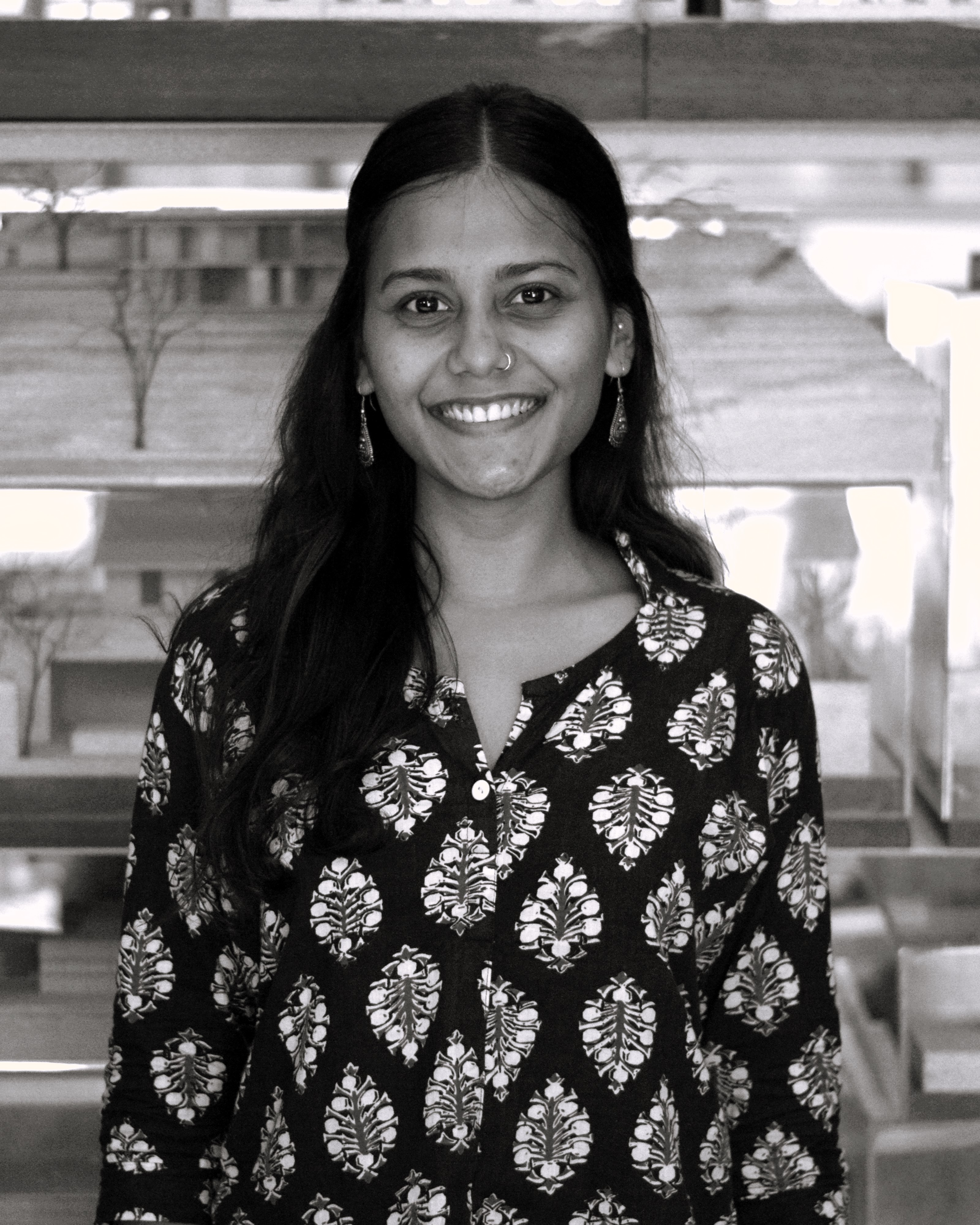
Anamika Sarker
Research Assistant
Anamika is an architect from the Jindal School of Art and Architecture, O.P. Jindal Global University. She works as a Research Assistant at the Architecture Foundation, where she manages the Foundation's archives and communications.
Research Assistant
Anamika is an architect from the Jindal School of Art and Architecture, O.P. Jindal Global University. She works as a Research Assistant at the Architecture Foundation, where she manages the Foundation's archives and communications.
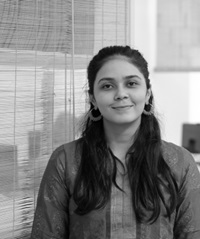
Anushka Kulkarni
Research Associate
Anushka is an architect from Kamla Raheja Vidyanidhi Institute for Architecture and Environmental Studies and is a Research Consultant at the Architecture Foundation. She is currently working on an architecture travel guide for Mumbai city.
Research Associate
Anushka is an architect from Kamla Raheja Vidyanidhi Institute for Architecture and Environmental Studies and is a Research Consultant at the Architecture Foundation. She is currently working on an architecture travel guide for Mumbai city.

Kuriakose Paulose
Director, Finance
Kuriakose is the Director-Finance, a post graduate in Commerce, with experience in Finance, HR, Taxation and Administration.
Director, Finance
Kuriakose is the Director-Finance, a post graduate in Commerce, with experience in Finance, HR, Taxation and Administration.

Aditya Sawant
Research Director, Housing
Aditya Sawant is an architect and urban designer based in Mumbai, practising as a researcher and academic. He has done his Masters in Urban Design from the Graduate School of Design , Harvard University and is an Assistant Professor at KRVIA, Mumbai.
Research Director, Housing
Aditya Sawant is an architect and urban designer based in Mumbai, practising as a researcher and academic. He has done his Masters in Urban Design from the Graduate School of Design , Harvard University and is an Assistant Professor at KRVIA, Mumbai.
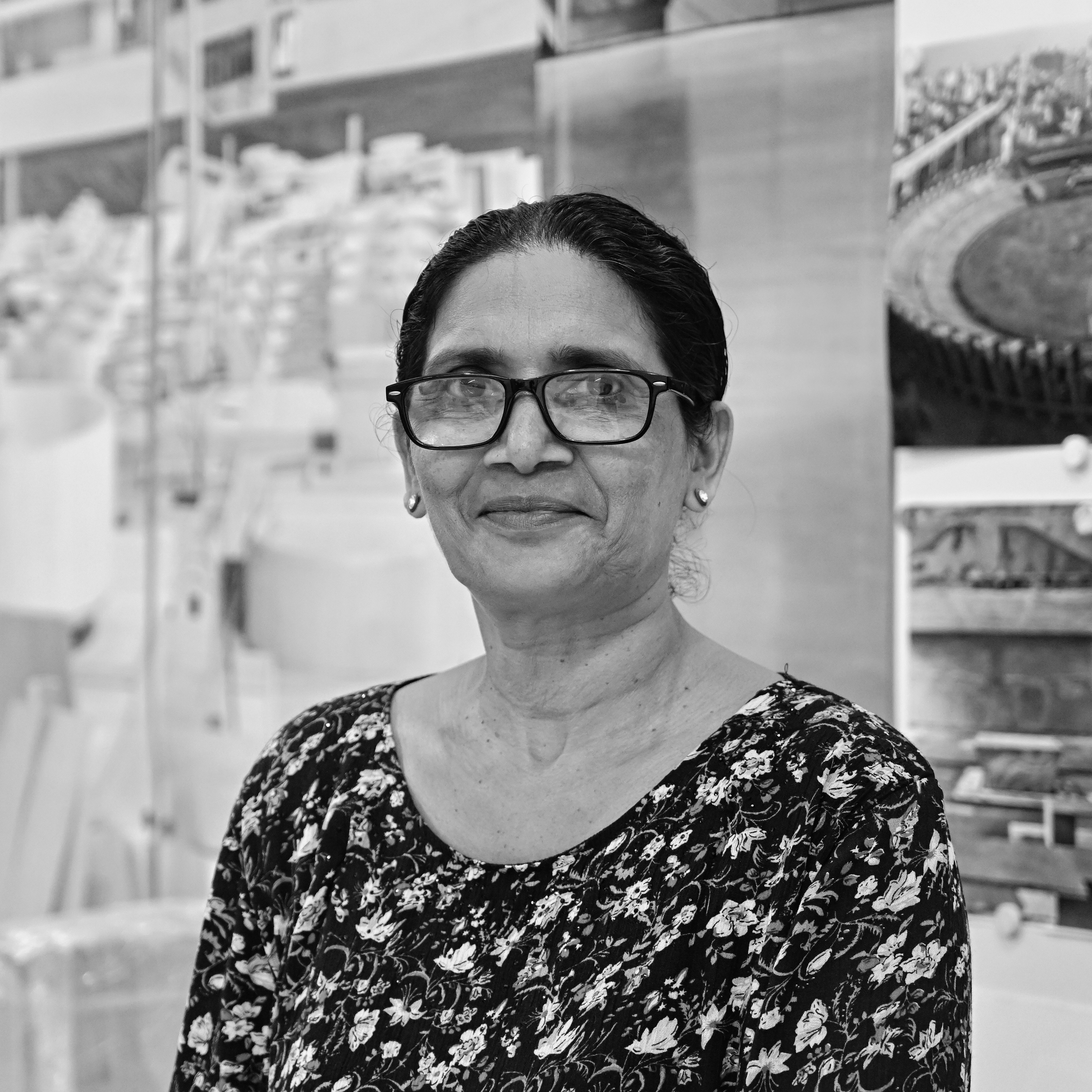
Priscilla Fernandes
Office Manager
Office Manager
collaborators

Urban Design Research Institute
Through research and multi-stakeholder interactions, UDRI aims to improve the quality of life for all its citizens, and works towards making the City and Region inclusive and humane, while balancing the cultural heritage and social fabric with equitable growth and efficient infrastructure. UDRI’s core urban planning policy and design interventions revolve around social and urban issues such as effective affordable housing efficient public transport, heritage conservation, environment and adequate standards for the provision of social amenities and infrastructure.

Goethe Institut / Max Mueller Bhavan Mumbai
The Goethe-Institut is the Federal Republic of Germany’s cultural institute, active worldwide. They promote the study of German abroad and encourage international cultural exchange.

Lakshmi Mittal and Family South Asia Institute
The Lakshmi Mittal and Family South Asia Institute at Harvard University (The Mittal Institute) engages in interdisciplinary research to advance and deepen the understanding of critical issues in South Asia and its relationship with the world.

RMA Architects
RMA Architects is an architectural practice with studios in Mumbai and Boston. From a studio established in Mumbai by Rahul Mehrotra in 1990, the practice was re-formed as RMA Architects in 2010.
advisory board
Amita Baig
Amita Baig is the former Executive Director of World Monuments Fund India. She ta Baig has authored and co-authored books like 'The Palaces of India', 'Taj Mahal: Multiple Narratives' and 'Mighty Maharajas: Forts and Palaces of India'
Hiral Satra
Hiral Satra is the representative of RMA Architects on the Board of Advisors. She is an architect with several years of experience and is involved in projects ranging from houses, institutions, cultural infrastructure, etc.
Kaiwan Mehta
An Architect, Academic and Researcher, Kaiwan is currently the dean of Balwant Sheth School of Architecture. He has authored books like 'Alice in Bhuleshwar: Navigationg a Mumbai Neighbourhood' and 'The Architecture of I.M. Kadri'.
Pradeep Dalal
Pradeep Dalal is an artist and writer. His work has been widely exhibited globally. He is on the faculty at the International Centre of Photography and the Milton Avery Graduate School of the Arts at Bard College.
Pradeep Dalal is an artist and writer. His work has been widely exhibited globally. He is on the faculty at the International Centre of Photography and the Milton Avery Graduate School of the Arts at Bard College.
Ranjit Hoskote
Indian poet, translator, cultural theorist and independent curator. Ranjit Hoskote has been honoured by the Sahitya Akademi, India's National Academy of Letters, with the Sahitya Akademi Golden Jubilee Award and the Sahitya Akademi Prize for Translation.
Indian poet, translator, cultural theorist and independent curator. Ranjit Hoskote has been honoured by the Sahitya Akademi, India's National Academy of Letters, with the Sahitya Akademi Golden Jubilee Award and the Sahitya Akademi Prize for Translation.
Rahul Mehrotra
Rahul Mehrotra is an architect, urbanist and educator who is the Founder Principal of RMA Architects and is Professor of Urban Design and Planning at the Department of Urban Planning and Design at Harvard University’s Graduate School of Design.
Rahul Mehrotra is an architect, urbanist and educator who is the Founder Principal of RMA Architects and is Professor of Urban Design and Planning at the Department of Urban Planning and Design at Harvard University’s Graduate School of Design.
board of trustees
Aarti Daftary
Trustee
Aarti Daftary is a philanthropist and an art collector with interest in supporting projects focussing on the city and urbanism.
Trustee
Aarti Daftary is a philanthropist and an art collector with interest in supporting projects focussing on the city and urbanism.
Archana Shah
Trustee
Archana Shah is a designer focussed on preserving and promoting traditional crafts and knowledge of indigenous artisans. She started Bandhej, a textile clothing company and has authored Shifting Sands, Kutch: A Land in Transition and Crating A Future: Stories of Indian and Sustainable Practices
Trustee
Archana Shah is a designer focussed on preserving and promoting traditional crafts and knowledge of indigenous artisans. She started Bandhej, a textile clothing company and has authored Shifting Sands, Kutch: A Land in Transition and Crating A Future: Stories of Indian and Sustainable Practices
Bahram Vakil
Trustee
Bahram Vakil is one of the founding partners of AZB & Partners and one of India’s foremost finance lawyers. He supports Wishing Well, an organization that attempts to bridge the gap by matching volunteers, services and donations with the needs of NGOs. He is a keen art collector and Trustee of the Marg Foundation, Mani Bhavan Gandhi Sangrahalaya and CSMVS Museum.
Trustee
Bahram Vakil is one of the founding partners of AZB & Partners and one of India’s foremost finance lawyers. He supports Wishing Well, an organization that attempts to bridge the gap by matching volunteers, services and donations with the needs of NGOs. He is a keen art collector and Trustee of the Marg Foundation, Mani Bhavan Gandhi Sangrahalaya and CSMVS Museum.
Jehangir Sorabjee
Trustee
Dr Jehangir Sorabjee is the Head of the Department of Medicine at the Bombay Hospital Institute of Medical Sciences. He is a keen urban photographer and has documented the city of Mumbai through images in his book titled - Above Bombay.
Trustee
Dr Jehangir Sorabjee is the Head of the Department of Medicine at the Bombay Hospital Institute of Medical Sciences. He is a keen urban photographer and has documented the city of Mumbai through images in his book titled - Above Bombay.
Nondita Correa Mehrotra
Trustee
Nondita Correa Mehrotra has over three decades of experience as an architect, working in India, and the US. She is Principal at RMA Architects, and the Director of the Charles Correa Foundation in Panjim, Goa.
Trustee
Nondita Correa Mehrotra has over three decades of experience as an architect, working in India, and the US. She is Principal at RMA Architects, and the Director of the Charles Correa Foundation in Panjim, Goa.
Rahul Mehrotra
Managing Trustee
Rahul Mehrotra is an architect, urbanist and educator who is the Founder Principal of RMA Architects and is Professor of Urban Design and Planning at the Department of Urban Planning and Design at Harvard University’s Graduate School of Design.
Managing Trustee
Rahul Mehrotra is an architect, urbanist and educator who is the Founder Principal of RMA Architects and is Professor of Urban Design and Planning at the Department of Urban Planning and Design at Harvard University’s Graduate School of Design.
